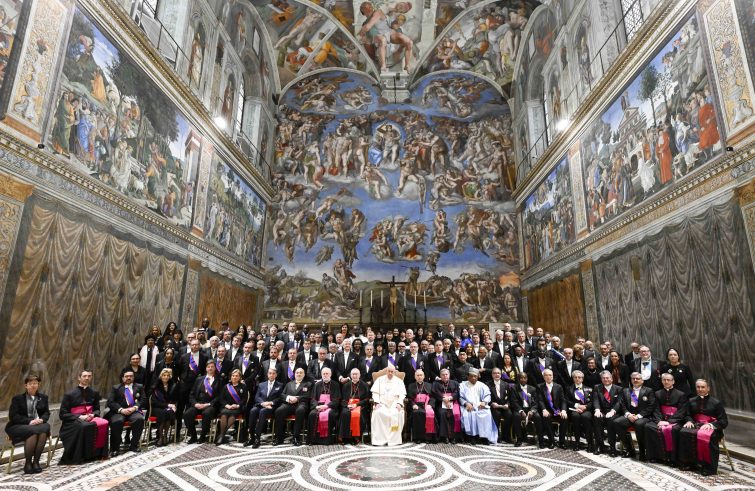
“Today the third world war is taking place in a globalised world where conflicts involve only certain areas of the planet directly, but in fact involve them all,” Pope Francis said in the traditional New Year’s address to the Diplomatic Corps that lasted about an hour, with the teachings of St. John XXIII’s Pacem in Terris at its heart. “The most recent example is certainly the war in Ukraine”, the Pope said referring to today’s tragic circumstances, with a renewed appeal for
“an immediate end to this senseless conflict,
whose effects are felt in entire regions, also outside of Europe due to its repercussions in the area of energy and food production especially in Africa and in the Middle East.” Integral disarmament, the Pope said, is the way forward: “The possession of nuclear weapons is immoral. Under the threat posed by nuclear weapons everyone is invariably defeated.” The Pope recalled the many hotbeds of war in the world, starting with the war-torn land of Syria and the Israeli-Palestinian conflict – expressing his hope for a “two-State solution”. The Holy Father mentioned his upcoming trip to Congo and South Sudan, under the banner of key words such as dialogue, peace and reconciliation.
“Despite the commitments undertaken by all states to respect human rights and the fundamental freedoms of each person, even today, in many countries, women are considered second-class citizens”,
the Pope highlighted the issue of human rights and the condition of Iranian and Afghani women today: “they are victims of violence and abuse and are denied access to education, employment, the expression of their talents, access to health care and even food.” Conversely, “in places where human rights are enjoyed in full by all, women can offer their unique contribution to the life of society and be the first allies of peace”. “Peace requires before all else the defence of life, a good that today is jeopardized not only by conflicts, hunger and disease, but all too often even in the mother’s womb, through the promotion of an
“alleged right to abortion”,
Francis denounced again: “no one can claim rights over the life of another human being, especially one who is powerless and therefore unable to defend him/herself.” Hence yet again Francis urged to combat “the throwaway culture that tragically also affects the sick, the disabled and the elderly” and to
“ensure that citizens are assisted in every phase of human life, until natural death, and to do so in a way in which each feels accompanied and cared for, even in the most delicate moments of life.”
The right to life is “also threatened in those places where the death penalty continues to be imposed, as is the case in these days in Iran.” “The death penalty cannot be employed for a purported ‘State justice’, since it does not constitute a deterrent, nor render justice to victims but only fuels the thirst for vengeance”, Francis denounced, with an appeal for “an end to the death penalty in legislation of all the countries of the world.”
In his address, the Pope also decried the ‘fear’ of life “which translates in many places in a fear of the future, of creating families and bringing children into life.” In this respect, he focused his attention to Italy in particular, where there is “a dangerous fall in the birth rate, a veritable demographic winter, which endangers the very future of society.” “I wish once more to encourage the beloved Italian people to confront with tenacity and hope the challenges of the present time, drawing strength from their religious and cultural roots.”
“It is unacceptable that some sections of the population should be excluded from education, as is happening to Afghan women”, Francis said, calling for the “educational catastrophe” to be countered. “May States find the courage to reverse the embarrassing and disproportionate relationship between public funding for education and expenditures on armaments”, Francis said. The Pope also made explicit references to religious freedom and to the countries where it is restricted: “one third of the world’s population lives under these conditions.” Francis condemned the “deplorable efforts made to exploit religion for purely political purposes”: “this runs counter to Christian understanding”, he said
For the Pope, the ongoing current conflict in Ukraine has made all the more evident the crisis that has long affected the multilateral system, which needs a “profound rethinking.” “It is not a matter of creating coalitions, but of providing opportunities for everyone to be partners in dialogue”, the Pope explained, guarding against the drift of “ideological totalitarianism” and “forms of ideological colonization”, calling for a return to “dialogue, mutual listening and negotiation.”
Migration is one issue where we cannot “move ahead at random”, the Pope said. The lost lives in the Mediterranean are “emblematic of the shipwreck of civilization.” In Europe, “there is a pressing need to reinforce the regulatory framework through the approval of the New Pact on Migration and Asylum.” At the same time, “solidarity requires that the burden of the operations needed to aid and care for the shipwrecked does not fall entirely on the people of the main landing points.”
“There is a need to restore dignity to business and to work”, was Francis’ appeal in the final part of his address, calling for progress in combating climate change. Francis delved into the subject of freedom, voicing “concern” over a “weakening of democracy”, as is happening in “various countries of the Americas.”










